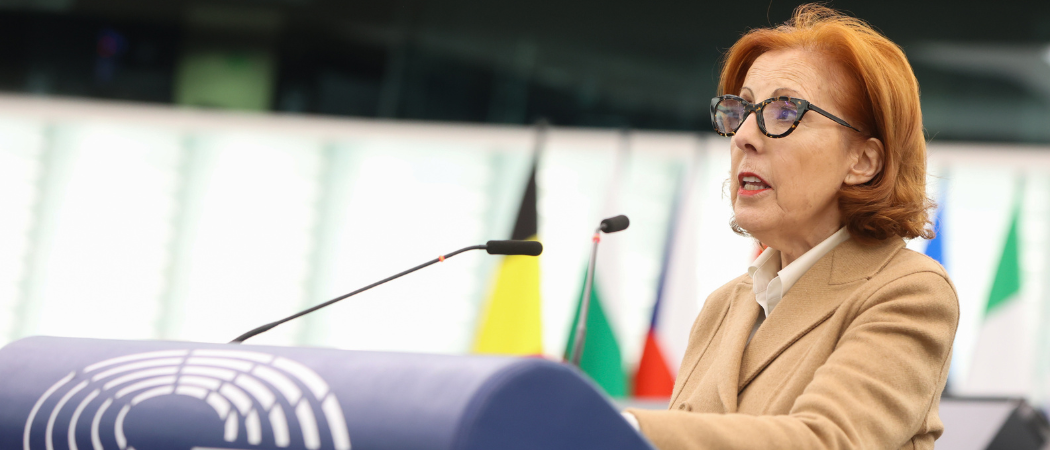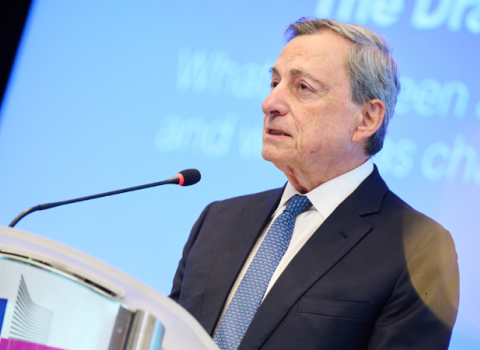Parliament is against streamlining the EU’s framework programme for R&I, Maria da Graça Carvalho told the Research & Innovation week event in Brussels

Maria da Graça Carvalho MEP. Photo credit: Frédéric Marvaux / European Union
The European Parliament wants to maintain the “multiplicity of instruments in Horizon Europe” in FP10, the next framework programme from 2028, said Maria da Graça Carvalho MEP, following repeated calls for the programme to be streamlined.
“We would not like to have a streamlined FP10,” she said during a debate on Horizon Europe’s successor, as part of the opening to the Research & Innovation week on Monday. “The beauty of this framework programme is exactly to have, in the same programme, fundamental and more applied research.”
A number of stakeholders have published position papers in recent months arguing for FP10 to have a sharper focus. A Danish government paper seen by Science|Business calls for the European Institute of Innovation & Technology (EIT) to be discontinued, citing overlaps with the European Innovation Council (EIC), and for the Widening programme supported member states with less developed research systems to be moved out of FP10.
In a paper published this week, EU-LIFE, an alliance of 15 life sciences research institutes, says “overly complex parts of Horizon Europe such as pillar 2, and programmes with questionable impact such as the EIT should be restructured and/or deprioritised to provide more funds to the EIC.”
Carvalho said Widening is “so important and should be increased”, and cited it alongside the EIC, EIT, the European Research Council, and the Marie Skłodowska-Curie Actions as instruments which should be maintained.
Carvalho has previously suggested the EIC and EIT could have common structures. They “probably don’t need to be two different agencies,” she told a Science|Business conference in February.
In response, Marc Lemaître, director general for research and innovation, said during the February panel that “everything is on the table” for FP10. There is “a certain consensus that we need to rationalise, especially if public means are short,” he added.
The calls for streamlining in part reflect concerns over tightening research budgets. MEPs including Carvalho are calling for FP10’s budget to be doubled to €200 billion, but this looks unlikely after Horizon Europe’s funding was cut in the recent mid-term budget review.
Carvalho said MEPs are “quite worried” about the messages coming from member states.
Also speaking on Monday, Willy Borsus, vice president of the Government of Wallonia, said it is “imperative that we commit to bolstering financial support for Horizon Europe”. EU research and innovation ministers have stressed the need for a stable budget, but they face an uphill battle convincing national governments not to shift funds to other areas such as defence.
Borsus also stressed the need for a regulatory framework that is conducive to investment. He called a proposal by EU advisory body the European Economic and Social Committee to introduce an innovation stress test for new legislation “an interesting proposal for which further reflection will be needed in the near future”.
Frank Monteny, director general for research and space at the Belgian Science Policy Office, said the focus should be on promoting synergies between EU and national funding mechanisms, through “early and continuous involvement of member states” in the strategic plans and work programmes for FP10.
Research commissioner Iliana Ivanova told the meeting the results of the Horizon 2020 evaluation show “we need to do better to broaden participation; to further simplify; to reinforce the dissemination, exploitation and deployment of results; to support the participation of women; and to enhance synergies with other initiatives.”
Basic versus applied research
While the focus in the EU is turning increasingly towards industrial competitiveness, speakers urged decisionmakers not to forget about basic research.
More fundamental research is needed “even in pillar 2” of the programme, which is dedicated to global challenges and industrial competitiveness, said Maria Chiara Carrozza, president of Italy’s National Research Council, and a member of the expert group on the interim evaluation of Horizon Europe.
The programme should also be less prescriptive, more “open to innovation and to curiosity-driven research” and “not try to define all details of future calls”, as we do not yet know the solutions to our future needs, she said.
It is also essential to introduce better links between basic and applied research, as the flow of results from one to the other is currently insufficient, said Carvalho.
She gave the example of the Clean Aviation joint undertaking. “You have the partnership, but the fundamental research is scattered in other programmes, and is not in contact with the development of the demonstrators,” she said.
The interim evaluation of Horizon Europe is due to be published early next year, then in mid-2025, the Commission will put forward its proposal for FP10. This will be “based on solid evidence” and on consultations with all relevant stakeholders, Ivanova said.
This week, the Commission is also due to publish its strategic plan for what remains of Horizon Europe, from 2025 to 2027.





 A unique international forum for public research organisations and companies to connect their external engagement with strategic interests around their R&D system.
A unique international forum for public research organisations and companies to connect their external engagement with strategic interests around their R&D system.